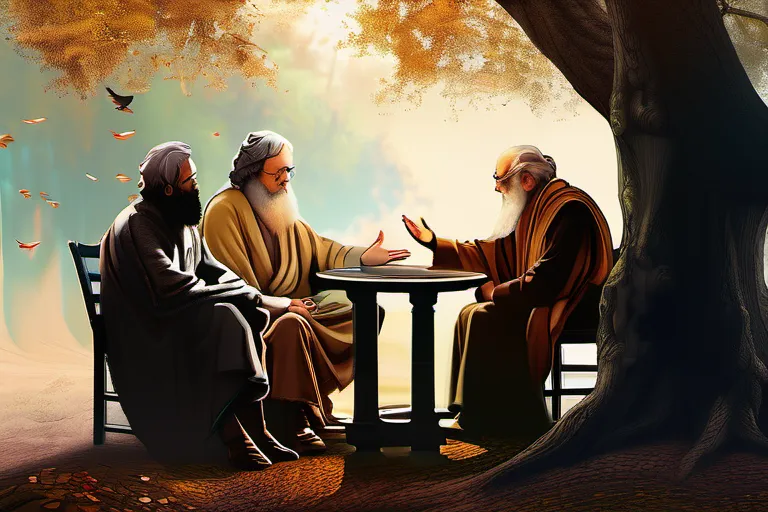Explore the philosophical movement that shaped modern Western thought
The Enlightenment was a cultural and intellectual movement that profoundly influenced Western thought. This article provides an in-depth exploration of its origins, key figures, ideas, and impact on society.
The Origins and Spread of the Enlightenment
The Enlightenment, often likened to a beacon illuminating the dark ages of intellectual stagnation, began its journey in 17th-century Europe but quickly spread across continents like wildfire. It was a period where reason replaced superstition and rational thought became the cornerstone of societal development.
How did such a movement start? Let’s consider the context: it emerged in response to the turmoil of the 17th century, including wars, religious conflicts, and social upheavals. As intellectuals sought answers beyond religion and tradition, they turned to nature itself for enlightenment.
The spread of the Enlightenment was not confined to Europe; it reached as far as America and even Africa. In America, thinkers like Benjamin Franklin and Thomas Jefferson embraced the principles of liberty and natural rights, which were pivotal in shaping the United States Constitution. Meanwhile, in France, figures like Voltaire and Rousseau challenged authority and advocated for social reform.
Consider this: if the Enlightenment was a ship setting sail towards a new era, who were its captains? Thinkers such as John Locke, with his theories on government by consent, or Isaac Newton, whose laws of motion laid the groundwork for scientific inquiry. These minds guided the movement through their writings and ideas.
The geographical spread and key figures are but two facets of this profound period. The next chapter will delve into the philosophical ideas that defined the Enlightenment, such as rationalism and empiricism, further exploring how these concepts reshaped the Western world’s understanding of knowledge and society. Stay with us as we continue our journey through time to uncover more about this transformative era.
Key Ideas of the Enlightenment
When we talk about the Enlightenment, it’s like stepping into a world where reason and evidence reign supreme. This philosophical movement that emerged in the 17th century and flourished throughout the 18th is often described as the age of reason. But what exactly defined this era? How did rationalism, empiricism, and natural rights shape modern Western thought?
Rationalism, with its emphasis on reason as a primary source of knowledge, can be seen as a beacon in the dark ages of superstition. Thinkers like René Descartes argued that all knowledge must be based on clear and distinct ideas. Is it not remarkable how such an idea could lay the groundwork for modern scientific inquiry? The Cartesian method of doubting everything until we find something undeniable has echoes in the systematic skepticism found in today’s empirical sciences.
Empiricism, on the other hand, is about experience. It emphasizes observation and experimentation as key to understanding the world. John Locke’s theory that knowledge comes from sensory experience suggests a direct link between Enlightenment thought and modern empiricism. Imagine trying to understand how the world works without relying on what we can see, hear, or touch – it would be like navigating through a foggy night. Empiricism provided the tools for clear sight.
Then there’s the concept of natural rights, which asserts that certain rights are inherent and inalienable to all humans. Thinkers like John Locke argued that life, liberty, and property were natural rights. This idea not only reshaped political theory but also laid the foundation for modern democracies. It’s as if these rights were inscribed on tablets of stone, a constant reminder of humanity’s entitlements.
The Enlightenment’s exploration of rationalism, empiricism, and natural rights was like planting seeds that would grow into the towering trees of our modern world. These ideas not only transformed how we think about knowledge but also influenced every aspect of society, from politics to science to daily life. As we delve deeper into these concepts, it becomes clear why the Enlightenment is considered a pivotal moment in human history.
The Enlightenment’s Impact on Science
The Enlightenment’s Impact on Science: A Journey into Modern Discovery
Imagine stepping back to the 18th century, a time when the world was still shrouded in the fog of superstition and tradition. The Enlightenment, with its powerful lens of reason and empirical evidence, began to peel away this veil, transforming not just philosophical thought but also the very fabric of scientific inquiry. How did this movement shape modern science? Let’s explore.
At its core, the Enlightenment emphasized rationalism and empiricism. These principles pushed scientists to question long-held beliefs and rely on observation and experimentation instead. Think about it—before the Enlightenment, scientific theories were often based on ancient texts or unproven assumptions. Now, they were grounded in real-world data.
One of the most significant changes brought by the Enlightenment was the scientific method. This systematic approach to inquiry involved making observations, forming hypotheses, and testing these through experiments—a process that is still central to scientific practice today. How revolutionary must this shift have been for those who previously dismissed experimental results as mere coincidences?
The period also witnessed key discoveries that laid the groundwork for modern science. Take Newton’s laws of motion, for instance. These principles transformed our understanding of physical phenomena, making it possible to predict and control natural processes with unprecedented accuracy. Could you imagine the awe and wonder felt by scientists as they unraveled the mysteries of nature?
The Enlightenment’s impact extended beyond just scientific theories. It spurred a revolution in how we think about knowledge itself—emphasizing the importance of evidence, logic, and objectivity. This shift fundamentally changed not only science but also how we approach problems across all disciplines.
The Enlightenment’s Influence on Politics and Society
The Enlightenment’s Influence on Politics and Society: Investigate the ways in which the Enlightenment shaped modern political thought, particularly the development of democracy and individual rights.
Imagine stepping into a world where kings and queens ruled not by divine right but through the consent of the governed—a concept that would have seemed almost absurd in the pre-Enlightenment era. The Enlightenment was more than just a period; it was a revolution in thought, paving the way for modern democratic societies.
So, what exactly did the Enlightenment bring to politics? It introduced the idea of reason as a powerful tool for governance. Thinkers like John Locke and Jean-Jacques Rousseau argued that government should be based on principles derived from reason rather than tradition or superstition. This shift was monumental; it transformed political discourse from one dominated by divine authority to one centered on the rationality of citizens.
Democracy, as we know it today, began to take shape during this era. The concept that the people have the right to participate in their government and governance through a system of representation was a radical idea. It challenged the notion that only a select few were fit to make decisions for society. Can you imagine how revolutionary this must have seemed at the time? People began to question who should hold power, leading to the formation of systems like representative democracy and the rule of law.
The Enlightenment also laid the groundwork for individual rights. The idea that each person has inherent dignity and freedom was a cornerstone of the movement. Thinkers like Voltaire and Mary Wollstonecraft championed the notion that individuals should be free from arbitrary power, advocating for liberty, equality, and justice. These principles are now fundamental to modern societies, yet their roots trace back to the Enlightenment.
Moreover, the Enlightenment fostered a culture of skepticism and inquiry in political discourse. It encouraged people to question authority and seek truth through reason and empirical evidence. This mindset has been crucial in shaping modern democracies, where citizens are expected not only to participate but also to engage critically with their government and institutions.
The legacy of the Enlightenment can be seen in the way we think about politics today. It transformed society from one ruled by fear and superstition into a realm of reason, liberty, and democracy. The ideas that emerged during this period continue to influence us, even as we navigate complex political landscapes in the 21st century.
Criticisms and Controversies Surrounding the Enlightenment
Have you ever wondered why some people today still question the very foundations laid by the Enlightenment? The Enlightenment, a period marked by a surge in reason and scientific inquiry, was hailed for its revolutionary ideas that transformed modern Western thought. But it also faced significant criticisms and controversies, which we must explore to understand its complex legacy.
One of the most prominent criticisms is the idea that the Enlightenment was overly optimistic about human nature. Critics argue that by focusing on reason as a panacea for society’s ills, Enlightenment thinkers overlooked the darker aspects of humanity, such as greed and corruption. Wasn’t it naive to think that mere intellect could cure all societal ills?
The push for universal rights also sparked debates about who exactly these rights applied to. The Enlightenment championed the idea of natural rights for all, but this was often interpreted in a way that excluded women and people of color. This led to questions: Was the Enlightenment truly inclusive, or did it merely offer a facade of equality?
The controversy surrounding free speech is another point of contention. While the principle of freedom of expression was paramount during the Enlightenment, there were also concerns about the abuse of this liberty. Some argue that without proper boundaries, freedom can lead to chaos and harm. How do we balance the right to free speech with the need for societal harmony?
The quest for scientific knowledge and progress also raised ethical questions. The use of human subjects in experiments and the exploitation of nature for industrial gains were just some of the challenges that arose. Should our pursuit of knowledge come at any cost, or is there a moral responsibility to ensure that progress benefits all?
The criticisms and controversies surrounding the Enlightenment are complex and multifaceted. They reflect ongoing debates about what it means to be human in an increasingly rational and technological world. Understanding these discussions helps us appreciate both the triumphs and the limitations of this pivotal period in history.
The Legacy of the Enlightenment Today
How does the Enlightenment, this grand intellectual movement from centuries past, still resonate today? It’s like the echoes of a distant thunder that reverberate through modern society. The thinkers and philosophers of the time sought to break free from the chains of tradition and superstition, advocating for reason and science over dogma. But what impact did this quest have on our world today?
The influence of the Enlightenment is evident in art, where the emphasis on individual expression and realism can be traced back to its ideals. Think about it: would Van Gogh’s swirling brushstrokes or Picasso’s cubist experiments be possible without the Enlightenment’s push for creative freedom? The movement encouraged artists to explore new forms, pushing boundaries just as they did with their ideas.
In literature, we see the Enlightenment’s legacy in the works of Voltaire and Rousseau, whose writings questioned authority and advocated for social justice. These themes are echoed in contemporary novels that challenge societal norms and advocate for equality. The quest for reason and truth in literature, championed by writers like Mary Wollstonecraft and her groundbreaking work ‘A Vindication of the Rights of Woman,’ continues to inspire modern authors striving to expose injustices.
And let’s not forget how the Enlightenment shaped popular culture. From films that explore philosophical ideas to TV shows that tackle moral dilemmas, the quest for understanding and improvement—key tenets of the Enlightenment—continues to drive much of our cultural discourse. Consider the hit series ‘The Expanse,’ which delves into complex ethical questions about power and morality, a direct reflection of the Enlightenment’s enduring influence.
So, as we stand in the present, looking back at the past, it’s clear that the Enlightenment isn’t just history; it’s an ongoing journey. Its principles have shaped our world, making us question authority, value reason, and strive for a better society. How will you contribute to this legacy? What new ideas will you bring to light in your own time?
Conclusion
 In conclusion, the Enlightenment marked a turning point in human history, fostering the development of modern democracy, science, and individual rights. Its legacy continues to shape our world today.
In conclusion, the Enlightenment marked a turning point in human history, fostering the development of modern democracy, science, and individual rights. Its legacy continues to shape our world today.











